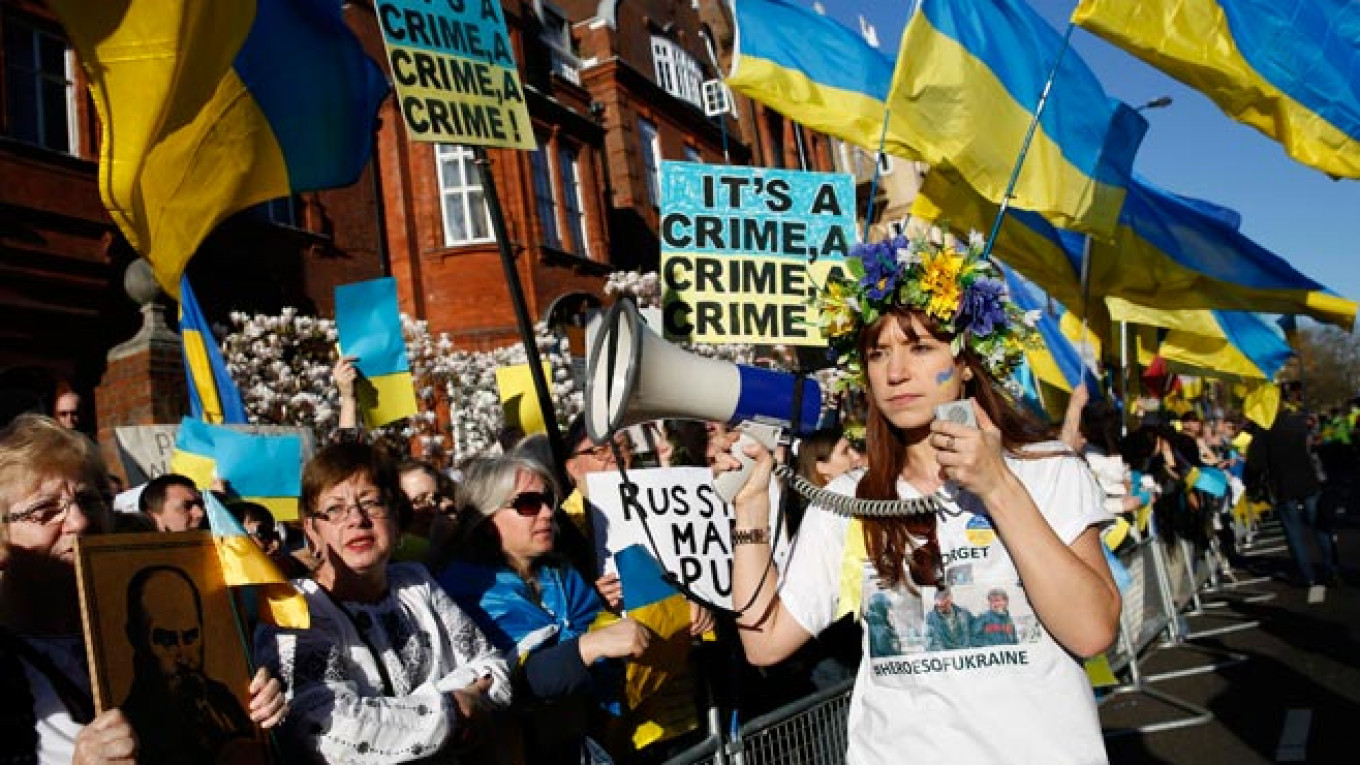"London is Russia's tawdry b-[expletive]," tweeted Simon Schama, a professor at Columbia University and BBC documentary film maker, on March 8.
His tweet referred to an op-ed written by Ben Judah titled "London's Laundry Business," published in The New York Times the day before.
Judah, author of "Fragile Empire: How Russia Fell In and Out of Love With Vladimir Putin," attacked the British government's failure to place trade sanctions on Russia during the Ukraine crisis and plebiscite in Crimea.
"Britain is ready to betray the U.S. to protect the City of London's hold on dirty Russian money. And forget about Ukraine," Judah said. He contrasted this with the White House's decision to impose visa restrictions on some Russian officials.
Judah said that the British government was working to protect Russian financial interests in London "even as Russian armored personnel carriers rumble around the streets of Sevastopol."
British businesses, Judah added, were becoming too closely tied to Russian interests. "This is Britain's growth business today: laundering oligarchs' dirty billions, laundering their dirty reputations," Judah said.
Judah's piece did not go unnoticed. Britain's Ambassador to Washington, Peter Westmacott, took strong exception to Judah's comments in a letter to The New York Times the following day.
"Britain, our partners in the European Union and the U.S. have been very clear," the ambassador said. "Russia must rapidly begin to de-escalate the crisis in Ukraine and engage in direct talks with the Ukrainian government or we will decide on measures against Russia, including economic and financial sanctions."
Westmacott then defended Britain as being at the forefront of an international effort to combat money laundering and corruption, and that as far as London was concerned "the door is firmly closed to those who do not abide by our laws and regulations."
He added that "our priority is to work with our partners to end the present crisis, deter further Russian military action, and allow the people of Ukraine to choose their own future."
Over in Britain, Sean Thomas, blogger for The Daily Telegraph, also took exception to Judah's comments, wondering if the White House imposing visa restrictions on some Russian officials would have much effect. "Yes, that will have them reaching for the Imodium in the Kremlin," said Thomas. "Literally dozens of Russians will have to cancel their holidays to Disneyland Florida."
However, Edward Luce in The Financial Times on March 16, said that Britain's reluctance to impose sanctions on Russia was "probably as much to do with BP's large joint venture in Siberia — and the dividends it pays out — as from diplomatic calculation."
So what is the extent of Russian wealth in Britain? Reuters reported that three of the five richest people in Britain were born in countries formerly part of the Soviet Union. According to The Sunday Times' Rich List, these billionaire were buyers of newspapers, football clubs and hugely expensive properties in London's exclusive Mayfair district. Russian businessman Roman Abramovich spent £59 million buying Chelsea Football Club and a further £90 million on a mansion in Kensington Palace Gardens, The Sunday Times reported.
More Russians than anyone else, Reuters said, had been granted "Tier-1 investor visas," which are linked to investing a minimum of £1 million in British assets.
The Sunday Times also reported that London was the location of choice for Russian companies wishing to sell shares to overseas investors. Seventy Russian companies are listed on the London Stock Exchange, in contrast to two Russian companies listed on the New York Stock Exchange. Companies from the former Soviet states have raised $82.6 billion in London over the past two decades.
Contact the author at [email protected]
A Message from The Moscow Times:
Dear readers,
We are facing unprecedented challenges. Russia's Prosecutor General's Office has designated The Moscow Times as an "undesirable" organization, criminalizing our work and putting our staff at risk of prosecution. This follows our earlier unjust labeling as a "foreign agent."
These actions are direct attempts to silence independent journalism in Russia. The authorities claim our work "discredits the decisions of the Russian leadership." We see things differently: we strive to provide accurate, unbiased reporting on Russia.
We, the journalists of The Moscow Times, refuse to be silenced. But to continue our work, we need your help.
Your support, no matter how small, makes a world of difference. If you can, please support us monthly starting from just $2. It's quick to set up, and every contribution makes a significant impact.
By supporting The Moscow Times, you're defending open, independent journalism in the face of repression. Thank you for standing with us.
Remind me later.






